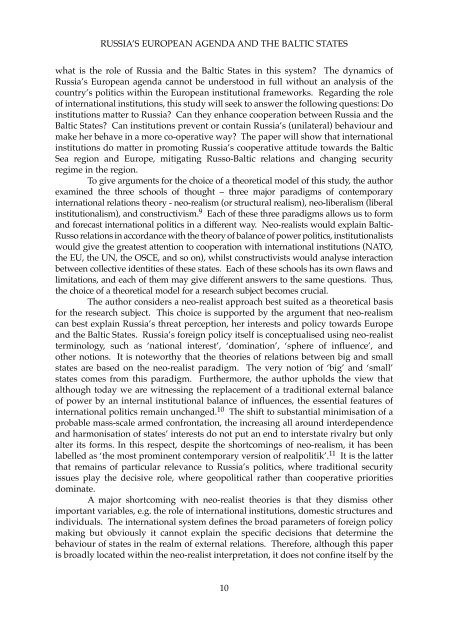Russia's European Agenda and The Baltic States - Defence ...
Russia's European Agenda and The Baltic States - Defence ...
Russia's European Agenda and The Baltic States - Defence ...
Create successful ePaper yourself
Turn your PDF publications into a flip-book with our unique Google optimized e-Paper software.
RUSSIA’S EUROPEAN AGENDA AND THE BALTIC STATES<br />
what is the role of Russia <strong>and</strong> the <strong>Baltic</strong> <strong>States</strong> in this system <strong>The</strong> dynamics of<br />
Russia’s <strong>European</strong> agenda cannot be understood in full without an analysis of the<br />
country’s politics within the <strong>European</strong> institutional frameworks. Regarding the role<br />
of international institutions, this study will seek to answer the following questions: Do<br />
institutions matter to Russia Can they enhance cooperation between Russia <strong>and</strong> the<br />
<strong>Baltic</strong> <strong>States</strong> Can institutions prevent or contain Russia’s (unilateral) behaviour <strong>and</strong><br />
make her behave in a more co-operative way <strong>The</strong> paper will show that international<br />
institutions do matter in promoting Russia’s cooperative attitude towards the <strong>Baltic</strong><br />
Sea region <strong>and</strong> Europe, mitigating Russo-<strong>Baltic</strong> relations <strong>and</strong> changing security<br />
regime in the region.<br />
To give arguments for the choice of a theoretical model of this study, the author<br />
examined the three schools of thought – three major paradigms of contemporary<br />
international relations theory - neo-realism (or structural realism), neo-liberalism (liberal<br />
institutionalism), <strong>and</strong> constructivism. 9 Each of these three paradigms allows us to form<br />
<strong>and</strong> forecast international politics in a different way. Neo-realists would explain <strong>Baltic</strong>-<br />
Russo relations in accordance with the theory of balance of power politics, institutionalists<br />
would give the greatest attention to cooperation with international institutions (NATO,<br />
the EU, the UN, the OSCE, <strong>and</strong> so on), whilst constructivists would analyse interaction<br />
between collective identities of these states. Each of these schools has its own flaws <strong>and</strong><br />
limitations, <strong>and</strong> each of them may give different answers to the same questions. Thus,<br />
the choice of a theoretical model for a research subject becomes crucial.<br />
<strong>The</strong> author considers a neo-realist approach best suited as a theoretical basis<br />
for the research subject. This choice is supported by the argument that neo-realism<br />
can best explain Russia’s threat perception, her interests <strong>and</strong> policy towards Europe<br />
<strong>and</strong> the <strong>Baltic</strong> <strong>States</strong>. Russia’s foreign policy itself is conceptualised using neo-realist<br />
terminology, such as ‘national interest’, ‘domination’, ‘sphere of influence’, <strong>and</strong><br />
other notions. It is noteworthy that the theories of relations between big <strong>and</strong> small<br />
states are based on the neo-realist paradigm. <strong>The</strong> very notion of ‘big’ <strong>and</strong> ‘small’<br />
states comes from this paradigm. Furthermore, the author upholds the view that<br />
although today we are witnessing the replacement of a traditional external balance<br />
of power by an internal institutional balance of influences, the essential features of<br />
international politics remain unchanged. 10 <strong>The</strong> shift to substantial minimisation of a<br />
probable mass-scale armed confrontation, the increasing all around interdependence<br />
<strong>and</strong> harmonisation of states’ interests do not put an end to interstate rivalry but only<br />
alter its forms. In this respect, despite the shortcomings of neo-realism, it has been<br />
labelled as ‘the most prominent contemporary version of realpolitik’. 11 It is the latter<br />
that remains of particular relevance to Russia’s politics, where traditional security<br />
issues play the decisive role, where geopolitical rather than cooperative priorities<br />
dominate.<br />
A major shortcoming with neo-realist theories is that they dismiss other<br />
important variables, e.g. the role of international institutions, domestic structures <strong>and</strong><br />
individuals. <strong>The</strong> international system defines the broad parameters of foreign policy<br />
making but obviously it cannot explain the specific decisions that determine the<br />
behaviour of states in the realm of external relations. <strong>The</strong>refore, although this paper<br />
is broadly located within the neo-realist interpretation, it does not confine itself by the<br />
10

















